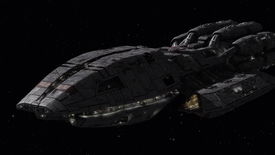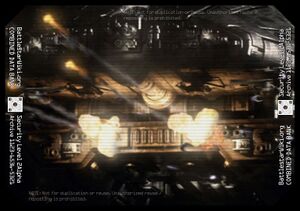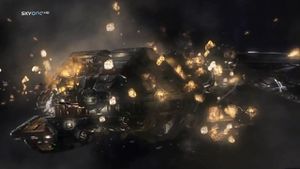Ancient Kobolian: Galleon
Mercury class battlestar
More languages
More actions
For the unnamed original class, to which Galactica belongs, see Galactica type battlestar.
|
| Mercury class battlestar | |||
|---|---|---|---|

| |||
| [show/hide spoilers] Spoilers hidden in infobox by default only. | |||
| Race: | Colonial | ||
| Type: | Military | ||
| FTL: | Yes | ||
| Propulsion: | * 8x sublight engines * Maneuvering thrusters | ||
| Crew: | Approx. 2,500 | ||
| Capacity: | |||
| CO: | {{{co}}} | ||
| XO: | {{{xo}}} | ||
| Role: | Carrier / Battleship | ||
| Weapons: | {{{weapons}}} | ||
| Armaments: | * 34x primary batteries (30x twin turrets, 4x fixed twin mounts) * Numerous point-defense cannons * Missile tubes | ||
| Defenses: | * Electronic countermeasures * Flak | ||
| Aircraft: | * Full Viper Mk. VII compliment * Full Raptor compliment | ||
| Aviation facilities: | * 2x flight pods * 4x flight decks * 80x Viper launch tubes * 2x Raptor launch tubes * Viper construction facilities | ||
| Emblem: | [[File:{{{patch}}}|175px|Ship's patch]] | ||
| Other Images: | Gallery | ||
| Dimensions | |||
| Length: | 5872 feet (1789.8m)[1] | ||
| Width: | {{{width}}} | ||
| Height: | {{{height}}} | ||
| Weight: | {{{weight}}} | ||
| Wingspan: | {{{wingspan}}} | ||
| Other: | {{{otherdi}}} | ||
| Cost: | {{{construction}}} | ||
| Construction Time: | {{{construction}}} | ||
| Hull Size: | {{{hull size}}} | ||
| Hull: | {{{hull}}} | ||
| FTL Cooldown: | {{{ftl cooldown}}} turns | ||
| Speed: | {{{speed}}} m/s | ||
| Turn Rate: | {{{turn rate}}}°/turn | ||
| Armor Total: | {{{armor total}}} | ||
| Armor Left: | {{{armor left}}} | ||
| Armor Right: | {{{armor right}}} | ||
| Armor Front: | {{{armor front}}} | ||
| Armor Rear: | {{{armor rear}}} | ||
| Armor Top: | {{{armor top}}} | ||
| Armor Bottom: | {{{armor bottom}}} | ||
| DRADIS Range: | {{{dradis range}}} m | ||
| Processing Power: | {{{processing power}}} | ||
| Munition Slots: | {{{munitions}}} | ||
| Munition Cooldown Period: | {{{munition cooldown}}} turns | ||
| Squadron Slots: | {{{squadrons}}} | ||
| Squadron Size: | {{{squadron size}}} | ||
| Special Abilities: | {{{special abilities}}} | ||
| Additional Information | |||
Mercury class battlestars are advanced Colonial capital warships/carriers of the Colonial Fleet, top-of-the-line vessels at the time of the Fall of the Twelve Colonies.
Overview
editApparently introduced some years after the First Cylon War, the Mercury class was designed to replace the aging Galactica type battlestars. It featured newer technologies, more automation, and could carry more Viper and Raptor support ships than its older predecessors. Despite the increase in capabilities, the Colonials seem to have more interest in producing the smaller Valkyrie types over the Mercury class, relegating the Mercury to a flagship/command role.
Layout
editGenerally speaking, this class compares to the older Galactica type battlestars in terms of overall specifications.
Main hull
edit- The fore section: Also known as the "alligator head," contains much of the living -and crew areas, including the CIC.
- The mid section: Contains the main flight decks, and aircraft service areas.
- The stern section: Contains the ship's engine pods, FTL drives, and engineering facilities needed to maintain the ship's propulsion.
Flight pods
edit- Main article: Flight pod
The Mercury class sports four flight pods of a newer and more advanced design. Two dorsal, and two ventral pods, with advanced gravity systems keeping them in sync. Vipers and Raptors are able to land both "right side up" and "upside down" in relation to the ship. The dual pods allow for greater Viper recovery during combat. The ships' hangar deck and launch tubes are located in between the "right side up," and "upside down" flight decks, and feature the same layout and design as seen on the older Galactica type battlestars. Despite advancements, these pods are still able to launch older Vipers, such as the Mk. II's. The Mercury-class also possesses Raptor launch tubes alongside its Viper launch tubes, enabling faster launch of scout craft compared to older battlestars.
The pods are also kept stationary and do not retract into the hull, allowing these vessels to jump out of a battle zone faster than their older counterparts (TRS: "The Captain's Hand").
Orthographics
editSpecifications
editPropulsion
edit- Main article: Propulsion in the Re-imagined Series
Mercury class ships are equipped with 8 sublight engines attached to the outer hull, and group into clusters of four along the ventral and dorsal surfaces of the ship. These ships also feature maneuvering thrusters placed at key points on the ship, including two main thrusters on the forward section of the alligator head.
Computer systems
edit- Main article: Computers in the Re-imagined Series
Unlike their older counterparts, the Mercury class features advanced computer systems, including the Command Navigation Program developed by computer scientist Dr. Gaius Baltar. Designed to assist in advanced navigation techniques, the program was uploaded to all ships of this class sometime before the Fall of The Colonies. During the attacks, the Cylons were able to gain command privileges over the battlestar's functions and shut them down through a backdoor placed in this program.
Armament
edit

- Main article: Weapons in the Re-imagined Series
- 34 automated antiship gun turrets (mounting 2 guns apiece).
- Gun batteries on the Mercury class are distributed all over the ship (TRS: "The Captain's Hand"), with the greatest concentration of large turrets found along the side of the ship, within the valley created by the upper and lower halves of the hull, and along the flight pods. Four are mounted on the underside of the upper hull on the ship's bow, below which sits four non-turreted large guns; these form the main forward batteries. Six turrets are mounted on each underside of the alligator head, grouped in pairs. There are also three turrets on the side of each flight pod, and two more turrets are mounted on the front and back of each flight pod. This amounts to a total of thirty-four main gun batteries. The turreted guns of the Mercury class have a higher rate of fire than Galactica's main guns when operating in flak mode, as demonstrated during a skirmish with Cylon War-era raiders (TRS: "Razor"). However, unlike Galactica, the Mercury class possesses no dorsal or ventral batteries, requiring it to angle its broadsides to the enemy in order to maximize the use of its firepower.
- Numerous smaller point-defense turrets, located in between hull plates.
- Numerous missile tubes.
- Electronic Counter-Measure (ECM) defense systems (TRS: "Resurrection Ship, Part II")
- Numerous Viper space superiority fighters.
- An example of this class, Pegasus, carries a complement of 50 Raptors and 200 Viper Mark VII fighters (8 squadrons and two reserve squadrons color coded blue, red, green, yellow, orange, purple, black, white, and reserve squadrons gold and silver) [2].
- The Mercury class battlestar has production facilities to build new Viper Mark VIIs from basic resources (TRS: "Scar").
- Numerous Raptor multi-role vehicles.
Crew
editThe standard crew complement of a Mercury class battlestar is in excess of 2,500 (TRS: "Pegasus," "Razor"). Advancement in Colonial technology have made many positions manned on older vessels (such as gun batteries) automated, increasing response time and efficiency (though said batteries can be manually operated in the event of systems failure). Mercury class ships may be bigger than these older vessels, but they only need half the crew to operate then Galactica type battlestars during the First Cylon War.
Ships In Class
editNotes
edit
The shape of the Mercury class resembles the Original Series battlestar closer than the Re-imagined Series' Galactica. It has eight engine pods, compared to Galactica's six. The pods aboard the Mercury class battlestar appear more directly integrated with its rear section, and its flight pods share the original angular shape.
The visual effects artist of the re-imagined Pegasus, Jose A. Perez, has commented that, "The new design was somewhat of a cross between the look of the original-series battlestars, and yet with elements of the new one. Aside from that, it has mostly hull plating (to absorb more damage), as opposed to the Galactica which shows more ribbing." Mr. Perez also commented that, "The harder edges (of the Pegasus) were intentional as well, to match the interior style of the sets more."
References
edit- ↑ Blog comment by Adam "Mojo" Lebowitz.
- ↑ Intelligence Debrief: Cylon Basestar, "Battlestar Galactica: The Official Magazine," June/July 2006, page 56.
 |
Sources for this page may be located at: |




